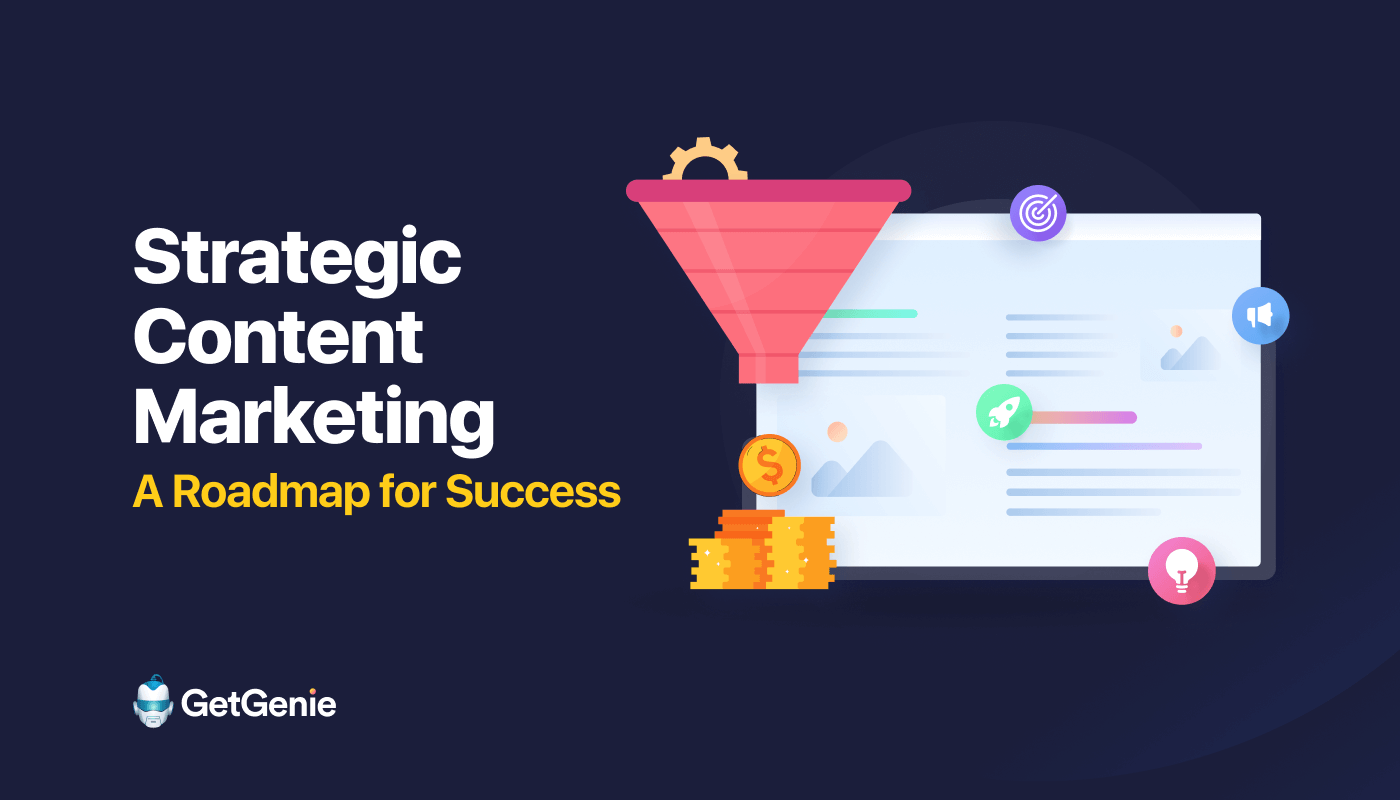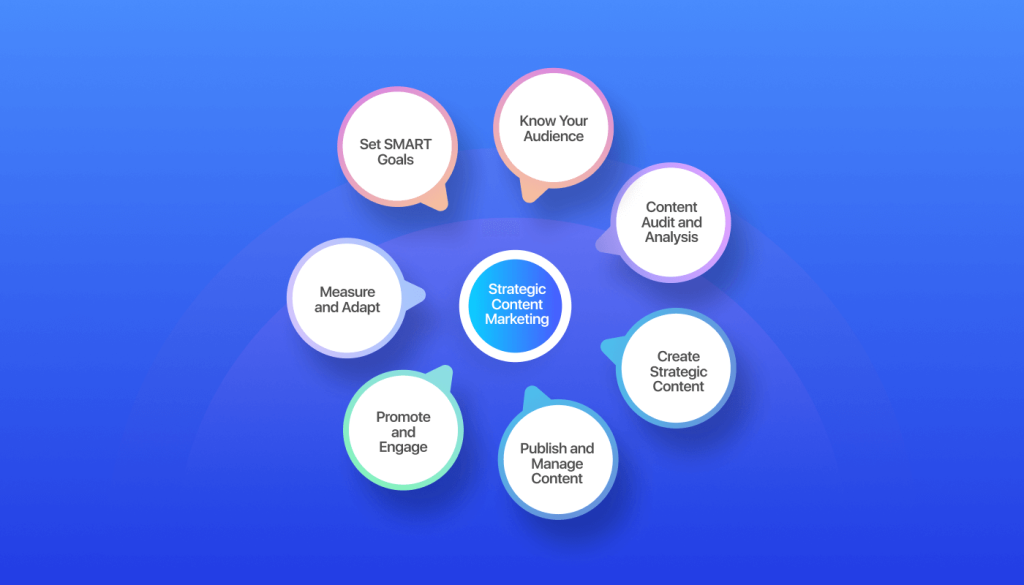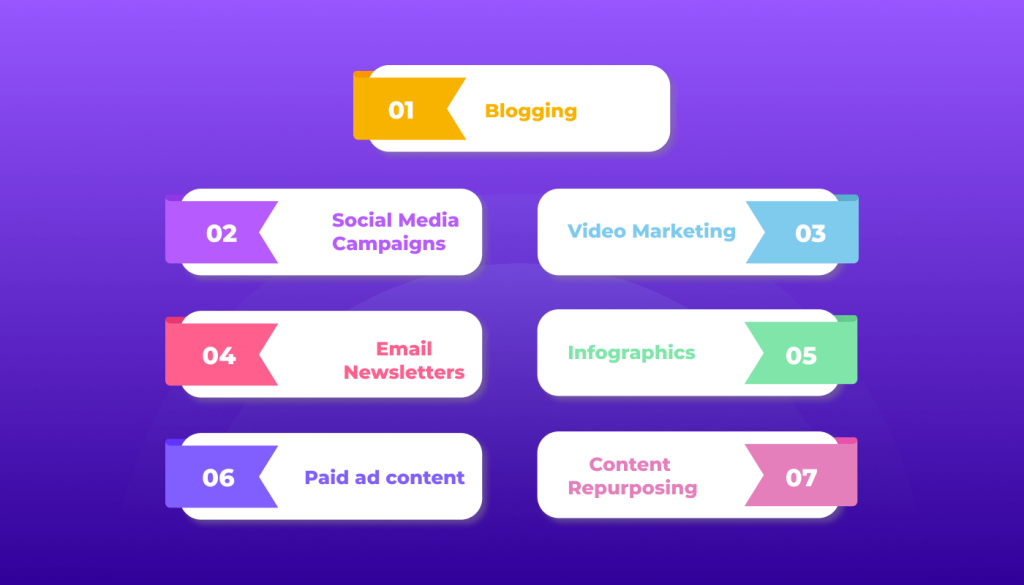Step-by-Step Strategic Content Marketing- A Roadmap for Success

Did you know, 82% of marketers are currently focusing on strategic content marketing?
~ According to Hubspot
Strategic Content Marketing initiatives should be a priority for any size of business. These steps help to engage their audience, drive demand, and achieve their marketing objectives!
But how to build a winning content marketing strategy?
In this blog post, I’ll reveal a 7-step guide on strategic content marketing with effective tips and tricks.
What Is Strategic Content Marketing?
Strategic content marketing is a focused approach to creating and sharing valuable content. The content marketing roadmap is developed with a clear purpose such as attracting and retaining your target audience to drive profitable actions.
For example, a software company might publish informative articles and video tutorials on the web development niche. It’ll help them establish themselves as an industry authority, generate leads, and increase sales of its products or services.
To succeed in strategic content creation, focus on these 5 key elements:
1. Audience Personas: Know your audience’s demographics, behaviors, and needs to create resonant content.
2. Brand Story: Develop a narrative reflecting your brand’s values, mission, and unique identity.
3. Content Marketing Mission: Define goals aligning content with broader business objectives.
4. Business Case: Justify content marketing investment by demonstrating potential ROI and strategic value.
5. Action Plan: Create a detailed plan with tactics, timelines, and required resources for execution.
Why Do You Need a Strategic Content Marketing Roadmap?
Content marketing strategies are essential for various sectors, including:
- Technology
- Healthcare
- Finance
- Education
- Retail
- Travel and Hospitality
- Real Estate
- Nonprofit and so on.
For instance, the American Express emphasizes its Trends & Insights section, offering the entrepreneurial clients with long-form articles as inspiration to help them run, grow and expand their businesses.
Why?
Here are the reasons:
- Increased Brand Awareness: A content marketing strategy helps to increase brand visibility and recognition among your target audience.
- Improved Customer Engagement: By providing valuable and relevant content, you can engage and build relationships with your audience.
- Lead Generation: Strategic content marketing can attract potential customers and generate leads through various channels.
- Enhanced Customer Loyalty: Consistently delivering high-quality content can help to establish trust and loyalty among your existing customer base.
- Higher Conversion Rates: Quality content can drive conversions by educating and persuading potential customers about your products or services.
- Better SEO Performance: Optimized content is essential for improving search engine rankings and driving organic traffic to your website.
- Cost-Effectiveness: Content marketing strategy is often more cost-effective than traditional marketing methods and can deliver a higher ROI over time.
What are the 7 steps of content marketing?

To create a strategic content marketing roadmap, you need well-structured and pre-planned steps aligning with your business. Here are the 7 essential steps to build an effective content marketing strategy!
Step 1: Set SMART Goals
At first, you have to define a SMART goal for your business at the beginning of preparing strategic content marketing. It means the goal or objective should be specific, measurable, achievable, relevant, and time-bound for your content marketing efforts. These goals should align with your overall business objectives.
💡 For example, a company can set a goal to increase website traffic by 20% within six months through effective content marketing.
Step 2: Know Your Audience
Always remember, that the audience is the heart of a successful content marketing strategy.
After setting a goal, you should go forward with research to understand the demographics, preferences, and pain points of your target audience. This knowledge will help you create your content to resonate with your audience and address their needs effectively.
💡 For instance, a software company needs to create technical content such as documentation/knowledge base/tutorials to address common challenges faced by developers and IT professionals
Step 3: Create Strategic Content
Creating quality content is crucial for strategic content marketing. You need to research keywords and identify topics and formats related to your target audience’s interests and your business objectives.
In terms of content generation, you must follow the Google helpful content guideline and E-E-A-T principle to serve quality content for your audiences.
In addition, you can utilize AI writing assistance like GetGenie AI which is an advanced AI-based tool for content, SEO, and Image generation.
GetGenie comes with 37+ writing templates for various content types including blog posts, WooCommerce product descriptions, social media captions, copywriting, etc. Also, you can get help in SEO elements keyword analysis, SERP analysis, competitor analysis, etc.
There is also an AI image generation tool integrated with it, called Genie Image, to make your content more colorful and visually appealing .
💡 For strategic content creation, an organization can focus on creating technical blog posts, knowledge bases, whitepapers, and case studies about industry trends, product updates, and customer success stories.
Step 4: Content Audit and Analysis
Next, you need to identify gaps, strengths, and opportunities in your existing content as well as your competitors. Analyzing metrics such as engagement, traffic, and conversions to gain insights is also a form of best content marketing strategy.
As a result, you will know what content performs well and what needs improvement. This analysis will inform your content strategy moving forward. In that case, AI-powered tools i.e. GetGenie AI can help you to do content gap analysis as well as head-to-head content analysis.
💡 A software firm can discover that their blog posts about specific programming languages receive more engagement than others. That indicates a demand for content related to those languages.
Step 5: Content Distribution
According to Content Marketing Institute, 79% of content marketers have an active blog!
To develop a strategic content marketing approach, you have to prepare and maintain a content calendar to plan and schedule the release of your content across various platforms. Also, make sure you have consistency in content distribution in different channels.
💡 Companies can publish a new blog post and YouTube video tutorial every week and share it on social media platforms like Facebook, LinkedIn, and Twitter.
Step 6: Promote and Engage
Implement a promotion strategy to increase the visibility and engagement of your content. You can include social media promotion, email newsletters, guest blogging, and collaborations with influencers or industry partners to develop strategic content marketing gradually.
💡 A mobile app development company can promote its latest software release through targeted email campaigns and sponsored social media posts. Also, technical blog promotion on social media is an effective form of content marketing.
Step 7: Measure and Adapt
Many simply neglect this step, but measuring performance and adapting to the changes are vital elements to create a winning content marketing strategy.
Monitor key performance indicators (KPIs) such as website traffic, engagement rates, and lead generation. Also, analyze data regularly to assess the effectiveness of your content marketing efforts and make adjustments as needed.
💡 If a particular type of content consistently receives low engagement, the companies should find out the issue by proper research. And then simultaneously focus on topics that resonate better with their audience.
Bonus: Strategic Content Marketing Tips
The strategic content marketing model has become an indispensable tool for all kinds of businesses including Business-to-business (B2B) and Business-to-customer(B2C).
Strategic Content Marketing Tips for B2B Firms:
1. Educational Content: Create in-depth guides, case studies, and whitepapers to provide valuable insights and solutions to the specific challenges faced by B2B customers.
2. Thought Leadership: Position your brand as an industry thought leader by sharing expert opinions, industry trends, and research-backed insights that demonstrate your expertise.
3. Account-Based Marketing (ABM): Prepare your content to address the needs and pain points of specific target accounts to personalize the experience and drive engagement.
4. Lead Generation: Develop gated/lead generation content such as ebooks, webinars, and industry reports to capture leads and nurture them through the sales funnel.
Strategic Content Marketing Tips for B2C Firms:
1. Visual Content: A significant 73% of respondents express a preference for learning about products or services through short videos. So, focus on visually appealing content such as product demo videos, user-generated content, and lifestyle imagery to capture the attention of B2C consumers.
2. Storytelling: Use storytelling techniques to create emotional connections with your audience and showcase how your products or services can enhance their lives.
3. User-Generated Content (UGC): Encourage customers to share their experiences with your brand through testimonials, reviews, and social media posts to build trust and credibility.
4. Influencer Marketing: Collaborate with influencers or brand ambassadors who resonate with your target audience to amplify your message and reach new customers.
5. Interactive Content: Experiment with interactive content formats such as quizzes, polls, and contests to engage with your audience and encourage participation.
7 Use Cases of Strategic Content Marketing

From informative blog posts to captivating videos and engaging social media campaigns, the versatility of content marketing offers endless possibilities. All of these combined efforts help to reach and resonate with your target audience.
Let’s explore 7 powerful use cases of content marketing strategies to boost your brand’s presence:
1. Blogging
According to a 2024 SEMrush report, almost 9 out of 10 marketers utilize blog posts to meet their content goals.
Regularly publishing informative and engaging blog posts to attract and educate your target audience. It will establish thought leadership, and drive traffic to your website.
2. Social Media Campaigns
Creating and sharing content across social media platforms to increase brand visibility. It will engage with your audience and drive website traffic and conversions.
3. Video Marketing
Did you know that 92.3% of the global audience is reached by online video content?
So, producing and sharing videos on platforms like YouTube or social media is a great form of content marketing. It will help to demonstrate your product features, share customer testimonials, and engage with your audience more dynamically.
4. Email Newsletters
Sending regular newsletters to your subscribers is a great way of content marketing. You can offer them all updates, promotions, and valuable content to nurture leads, maintain customer relationships, and drive sales.
5. Infographics
Creating visually appealing graphics to present complex information is also an example of a successful content marketing strategy. An easy-to-understand infographic format will make it shareable on social media and drive traffic back to your website.
6. Paid Ad Content
Using paid advertising platforms like Google Ads, or social media (Facebook, LinkedIn, Twitter) ads to promote your content is another popular strategy of content marketing. It helps to target audiences, increase brand awareness, and drive conversions.
7. Content Repurposing
Last but not least, content repurposing is a great strategy for content marketing. Repurposing existing content into different formats such as ebooks, podcasts, or webinars is a great way to reach new audiences.
A survey also revealed that 46% of marketers believe repurposing content is more effective than creating entirely new content. So, this practice helps reinforce messaging and maximize the value of your content investments.
How to use AI in Strategic Content Marketing?
AI tools like GetGenie AI can help to make an effective content strategy roadmap. Using this tool, you can analyze data, personalize content, automate creation and distribution, optimize for SEO, create visuals, and enhance overall content marketing effectiveness.
AI SEO tools and AI content creators help you expedite your content marketing workflows. However, it is best to humanize the AI content, to add realism and human tonality.
FAQs

Final Words
An effective strategy of content marketing can connect with your targeted audience, build brand authority, and drive meaningful results. Here we have discussed 7 step-by-step strategies of content marketing for your business. Plus, you need to focus on quality, measure effectiveness, and adapt to the changing needs of your audience.
By prioritizing valuable content, data-driven insights, and utilizing innovative technologies like AI, you can definitely stay ahead in today’s competitive business world.
If you have any queries or suggestions, feel free to comment below.
